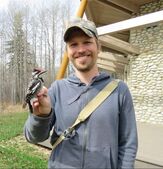
Current Lab Members
Brian Weeks, PI
I joined the School for Environment and Sustainability as an Assistant Professor in 2019. My research is focused on understanding how the world's biodiversity is responding (and will respond) to human impacts on the environment. I combine museum specimen-based work, genomics, and fieldwork. I have focused most of my work on birds, with a special emphasis on birds of the Solomon Islands, and North American migratory birds, though increasingly I am zooming out to larger scales and I am interested in expanding to both new areas and taxa. Please see my CV or Google Scholar profile for more detail.
Brian Weeks, PI
I joined the School for Environment and Sustainability as an Assistant Professor in 2019. My research is focused on understanding how the world's biodiversity is responding (and will respond) to human impacts on the environment. I combine museum specimen-based work, genomics, and fieldwork. I have focused most of my work on birds, with a special emphasis on birds of the Solomon Islands, and North American migratory birds, though increasingly I am zooming out to larger scales and I am interested in expanding to both new areas and taxa. Please see my CV or Google Scholar profile for more detail.

Jacob Berv, Postdoc
As a Schmidt AI in Science Fellow, Jake will investigate applications of AI and machine learning approaches to basic questions in ecology and evolutionary biology. Longer term, Jake aspires to lead an independent research group and continue to make contributions to the field of evolutionary biology.
Jake completed a B.S. in Biology at Yale University, in 2010, and a PhD. in Ecology and Evolutionary Biology at Cornell University, in 2019. Jake's research (jakeberv.com) integrates data from natural history, ecology, genomics, and paleontology—often through the application of novel computation tools—in order to understand the links between micro- and macroevolution. Jake is most fascinated by how microevolutionary genetic processes operating at the level of individual organisms and populations propagate through the tree of life and time to generate macroevolutionary patterns. Taking this lens, Jake's research aims to investigate several overarching themes in systematic biology: What are the roles of evolutionary contingency and convergence in generating patterns of biodiversity? When and why might one of these modes of evolution predominate over the other? What are the drivers and correlates of evolutionary change? Addressing these questions requires an appeal to both population scale phenomena, as well as larger scale patterns that can only be directly observed from the fossil record. Overall, Jake's interdisciplinary approach to systematic biology recognizes that variation in the “tempo” or speed, and “mode” or processes of evolutionary change can confound the interpretation of phylogenetic comparative data (bit.ly/avian_eb), and seeks to discover the causal factors underlying evolutionary patterns.
As a Schmidt AI in Science Fellow, Jake will investigate applications of AI and machine learning approaches to basic questions in ecology and evolutionary biology. Longer term, Jake aspires to lead an independent research group and continue to make contributions to the field of evolutionary biology.
Jake completed a B.S. in Biology at Yale University, in 2010, and a PhD. in Ecology and Evolutionary Biology at Cornell University, in 2019. Jake's research (jakeberv.com) integrates data from natural history, ecology, genomics, and paleontology—often through the application of novel computation tools—in order to understand the links between micro- and macroevolution. Jake is most fascinated by how microevolutionary genetic processes operating at the level of individual organisms and populations propagate through the tree of life and time to generate macroevolutionary patterns. Taking this lens, Jake's research aims to investigate several overarching themes in systematic biology: What are the roles of evolutionary contingency and convergence in generating patterns of biodiversity? When and why might one of these modes of evolution predominate over the other? What are the drivers and correlates of evolutionary change? Addressing these questions requires an appeal to both population scale phenomena, as well as larger scale patterns that can only be directly observed from the fossil record. Overall, Jake's interdisciplinary approach to systematic biology recognizes that variation in the “tempo” or speed, and “mode” or processes of evolutionary change can confound the interpretation of phylogenetic comparative data (bit.ly/avian_eb), and seeks to discover the causal factors underlying evolutionary patterns.
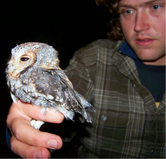
Scott Yanco, Postdoc
Scott is a broadly trained animal ecologist primarily interested in understanding the mechanistic links between the movements of individual animals and the dynamics of populations, with particular emphasis on migratory species. His research leverages emerging biologging technologies to generate insights about how individual animals interact with environments, how these interactions affect life history, and how these processes scale up to produce emergent ecological phenomena - especially identifying those factors that regulate population growth dynamics. Scott’s work often combines approaches, often fusing field-based studies, community-generated datasets, and theoretical analyses using quantitatively rigorous approaches. You can connect with Scott via his website.
Scott is a broadly trained animal ecologist primarily interested in understanding the mechanistic links between the movements of individual animals and the dynamics of populations, with particular emphasis on migratory species. His research leverages emerging biologging technologies to generate insights about how individual animals interact with environments, how these interactions affect life history, and how these processes scale up to produce emergent ecological phenomena - especially identifying those factors that regulate population growth dynamics. Scott’s work often combines approaches, often fusing field-based studies, community-generated datasets, and theoretical analyses using quantitatively rigorous approaches. You can connect with Scott via his website.

Tiffany Dias, PhD Student
Tiffany is broadly interested in exploring how evolutionary and population dynamics change in response to human-induced rapid environmental change. More specifically, she is interested in improving our understanding of evolutionary potential and our ability to predict long-term population persistence to plan for species recovery. She graduated from the University of Rochester in 2019 with degrees in Computational Biology (BS) and International Relations (BA). When not in the lab, Tiffany enjoys reading, climbing, and spending time outdoors.
Tiffany is broadly interested in exploring how evolutionary and population dynamics change in response to human-induced rapid environmental change. More specifically, she is interested in improving our understanding of evolutionary potential and our ability to predict long-term population persistence to plan for species recovery. She graduated from the University of Rochester in 2019 with degrees in Computational Biology (BS) and International Relations (BA). When not in the lab, Tiffany enjoys reading, climbing, and spending time outdoors.
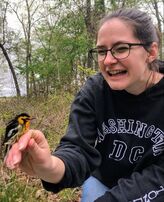
Charlotte Probst, PhD Student
Charlotte is interested in the impacts of climate change on avian morphology and migration. In the past, she has researched Allen’s Rule in desert birds, roosting behaviors in Chimney Swifts, and bird species distributions in the HJ Andrews Experimental Forest. When she’s not studying birds, you can find her trying to visit all 162 of Ann Arbor’s parks, thinking about environmental ethics, or learning how to ice skate.
Charlotte is interested in the impacts of climate change on avian morphology and migration. In the past, she has researched Allen’s Rule in desert birds, roosting behaviors in Chimney Swifts, and bird species distributions in the HJ Andrews Experimental Forest. When she’s not studying birds, you can find her trying to visit all 162 of Ann Arbor’s parks, thinking about environmental ethics, or learning how to ice skate.
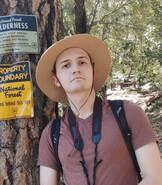
Isaiah Clark, Master’s Student
Isaiah is interested in how avian species distributions respond to human activity and how such changes can inform our most pressing conservation needs. A recent transplant from St. Paul, he graduated from the University of Minnesota in 2020 with a degree in Ecology, Evolution and Behavior (BS). Outside of school he enjoys birding, gardening, visiting friends and family, and reading the works of Edward Abbey.
Isaiah is interested in how avian species distributions respond to human activity and how such changes can inform our most pressing conservation needs. A recent transplant from St. Paul, he graduated from the University of Minnesota in 2020 with a degree in Ecology, Evolution and Behavior (BS). Outside of school he enjoys birding, gardening, visiting friends and family, and reading the works of Edward Abbey.
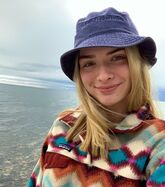
Ena Humphries, Master's Student
Ena is predominantly interested in the effects of climate change and other anthropogenic activities on avian biodiversity and how empirical research can support conservation efforts. Outside of the lab, she enjoys spending time with her *indoor-only* cat, birding, and adding to her iNaturalist observation list.
Ena is predominantly interested in the effects of climate change and other anthropogenic activities on avian biodiversity and how empirical research can support conservation efforts. Outside of the lab, she enjoys spending time with her *indoor-only* cat, birding, and adding to her iNaturalist observation list.
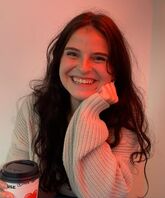
Summer Mengarelli, Master's Student
Summer is interested in how information science professionals can partner in and support research on climate change and avian conservation. A double-master's student in Geospatial Data Sciences and Digital Archives & Libraries, she hopes to study the management, dissemination, and use of scientific data. Outside of school, she's usually birding, reading, or lifting weights.
Summer is interested in how information science professionals can partner in and support research on climate change and avian conservation. A double-master's student in Geospatial Data Sciences and Digital Archives & Libraries, she hopes to study the management, dissemination, and use of scientific data. Outside of school, she's usually birding, reading, or lifting weights.
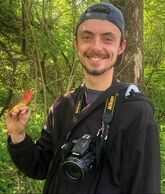
Isaac Smith, Master's Student
Isaac is interested in avian conservation and the effects of climate change on native species in the US. More specifically, he seeks to understand how rapid climate warming over the past century has affected native bird species, and how those effects may continue in the future. For his Master's, he hopes to conduct field work with American Robins to determine how and why their size and growth patterns change during development as a result of rising global temperatures. He is also an avid birder and can often be found chasing rare species and practicing his photography skills in the field.
Isaac is interested in avian conservation and the effects of climate change on native species in the US. More specifically, he seeks to understand how rapid climate warming over the past century has affected native bird species, and how those effects may continue in the future. For his Master's, he hopes to conduct field work with American Robins to determine how and why their size and growth patterns change during development as a result of rising global temperatures. He is also an avid birder and can often be found chasing rare species and practicing his photography skills in the field.
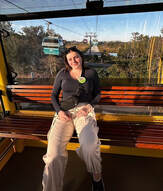
Jessica Falls, Undergraduate Researcher
Jessica is currently an undergraduate sophomore with an intended major in PitE and a specialization in sustainable business. She is still exploring specific interests but enjoys learning about how anthropogenic activities are impacting climate change and in return, how climate change is affecting various species. She enjoys travelling with friends and discovering new places to visit.
Jessica is currently an undergraduate sophomore with an intended major in PitE and a specialization in sustainable business. She is still exploring specific interests but enjoys learning about how anthropogenic activities are impacting climate change and in return, how climate change is affecting various species. She enjoys travelling with friends and discovering new places to visit.

Zejun Li, Undergraduate Researcher
Ting Ting is an undergraduate majoring in Ecology, Evolution, and Biodiversity. She's broadly interested in studying morphological evolution and the effects of climate change on migration patterns and hopes to get involved in fieldwork. Ting Ting enjoys birding in new places, playing ultimate frisbee, and reading.
Ting Ting is an undergraduate majoring in Ecology, Evolution, and Biodiversity. She's broadly interested in studying morphological evolution and the effects of climate change on migration patterns and hopes to get involved in fieldwork. Ting Ting enjoys birding in new places, playing ultimate frisbee, and reading.
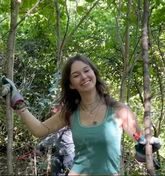
Isabelle Relyea, Undergraduate Researcher
Isabelle is a freshman in the Program in the Environment, starting her journey in environmental research. Generally, she is interested in exploring the impacts of climate change on the natural world. She also enjoys climbing, being outdoors, and traveling.
Isabelle is a freshman in the Program in the Environment, starting her journey in environmental research. Generally, she is interested in exploring the impacts of climate change on the natural world. She also enjoys climbing, being outdoors, and traveling.
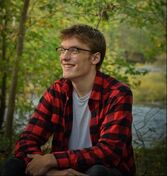
Mark Ziebell, Undergraduate Researcher
As an undergraduate freshman Mark is still figuring out his specific interests; he is currently trying to understand variation in morphological responses to large scale environmental changes in birds. In the future Mark hopes to get involved in field work. He thoroughly enjoys birding and Kensington Metropark is his favorite place to visit. He also enjoys reading and playing basketball.
Gone but not forgotten!!
As an undergraduate freshman Mark is still figuring out his specific interests; he is currently trying to understand variation in morphological responses to large scale environmental changes in birds. In the future Mark hopes to get involved in field work. He thoroughly enjoys birding and Kensington Metropark is his favorite place to visit. He also enjoys reading and playing basketball.
Gone but not forgotten!!
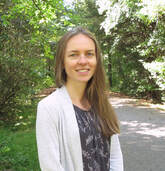
Marketa Zimova, Postdoc (2019-2021)
Marketa was a UM Institute for Global Change Biology postdoc in the lab. While in the lab, Marketa worked on a specimen series of >70,000 birds collected over 40 years to understand changes in morphology and migratory phenology in an effort to improve our understanding of the impacts of warming temperatures on North American birds. After her time at UM, Marketa took a faculty job at Appalachian State University; you can read more about her work at her website or her Google Scholar profile.
Marketa was a UM Institute for Global Change Biology postdoc in the lab. While in the lab, Marketa worked on a specimen series of >70,000 birds collected over 40 years to understand changes in morphology and migratory phenology in an effort to improve our understanding of the impacts of warming temperatures on North American birds. After her time at UM, Marketa took a faculty job at Appalachian State University; you can read more about her work at her website or her Google Scholar profile.
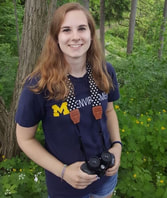
Madeleine Klemz, Master's Student (2020-2022)
Madeleine conducted field work, warming cardinal, robin, and catbird nests to try to understand the impacts of temperature during development on size and growth patterns.
Madeleine conducted field work, warming cardinal, robin, and catbird nests to try to understand the impacts of temperature during development on size and growth patterns.

Mingyu Zhang, Master's Student (2020-2022)
Mingyu's thesis was a large-scale analysis of the evidence of Bergmann's Rule using the first installment of the Skelevision dataset! He found that there is some evidence of Bergmann's Rule, and we are continuing to build the dataset to definitively test some of Mingyu's ideas.
Mingyu's thesis was a large-scale analysis of the evidence of Bergmann's Rule using the first installment of the Skelevision dataset! He found that there is some evidence of Bergmann's Rule, and we are continuing to build the dataset to definitively test some of Mingyu's ideas.
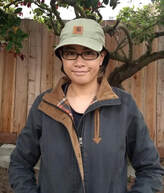
Morgan Dean, Master's Student (2020-2022)
Morgan combined morphological, phylogenetic, and spatial analyses to show that landscape permeability predicts genomic divergence in birds. Following her MS at SEAS, she started a PhD at UCLA to focus on remotely-sensed landscape-attributes and their role in shaping natural systems.
Morgan combined morphological, phylogenetic, and spatial analyses to show that landscape permeability predicts genomic divergence in birds. Following her MS at SEAS, she started a PhD at UCLA to focus on remotely-sensed landscape-attributes and their role in shaping natural systems.
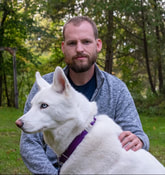
Bruce O'Brien, Research Technician (2019-2022)
Bruce heroically got Skelevision up and running. During his time in the lab, he was insanely productive. Among other things, he published a first authored paper, and was a co-author on two others that came out of the lab. This was in addition to photographing (single-handedly!) the entirety of UM's collection of ~12,000 passerine skeletal specimens, after refining the design of the "bone dumper".
Bruce heroically got Skelevision up and running. During his time in the lab, he was insanely productive. Among other things, he published a first authored paper, and was a co-author on two others that came out of the lab. This was in addition to photographing (single-handedly!) the entirety of UM's collection of ~12,000 passerine skeletal specimens, after refining the design of the "bone dumper".
